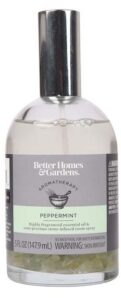The Centers for Disease Control (CDC) has confirmed that the strain of Burkholderia pseudomallei bacteria that caused a 2021 outbreak of melioidosis in Georgia, Kansas, Texas, and Minnesota is a genetic match to the bacteria found in the bottle of Better Homes & Gardens aromatherapy spray from the home of one of the victims. The pathogen in the bottle was genetically matched to the bacterial strains taken from the four patients who were sickened. Two patients, who lived in Georgia and Kansas, died from the disease.
Aromatherapy Bottle Confirmed As Source of Infections
 A bottle of the Better Homes & Gardens Lavender & Chamomile with Gemstones spray tested positive for Burkholderia pseudomallei, the bacteria that causes the melioidosis infection. The DNA fingerprint of the bacteria in the spray and in the patients was the same. So the spray, or one of its ingredients, caused these melioidosis infections.
A bottle of the Better Homes & Gardens Lavender & Chamomile with Gemstones spray tested positive for Burkholderia pseudomallei, the bacteria that causes the melioidosis infection. The DNA fingerprint of the bacteria in the spray and in the patients was the same. So the spray, or one of its ingredients, caused these melioidosis infections.
“When you think about the thousands of things people come in contact with around their homes, it’s remarkable we were able to identify the source and confirm it in the lab. CDC scientists and our partners found the proverbial needle in the haystack.”
– Inger Damon, MD, PhD, director of CDC’s Division of High-Consequence Pathogens and Pathology said in a statement,
Manufacturer in India Contacted – Authorities Trying to Determine if Other Products May be Affected
The Consumer Product Safety Commission, Walmart, and the CDC have contacted the manufacturer in India to try to figure out whether ingredients from that particular spray were used in any other products. The CDC has tested another bottle of the spray and it was also positive for Burkholderia pseudomallei.
Consumers Should Stop Using This Spray Immediately
If you purchased a bottle of BH&G Aromatherapy Spray with Gemstones in any scent, online or at Walmart (stores known to have sold it are on this list), between February and October 21, 2021, stop using it immediately.

You can contact food safety attorney Fred Pritzker for help by calling 1-888-377-8900 or texting 612-261-0856.
Noted lawyer Fred Pritzker, who has represented many families in wrongful death lawsuits and other lawsuits against manufacturers and stores, said, “We are glad the CDC did such excellent work and identified the outbreak strain. Hopefully no one else will become seriously ill because of this contaminated product.”
You should not throw the spray away in the garbage and do not pour the contents of the aromatherapy spray bottles down the drain. The bacteria could become established in an area if it ends up in landfills and it could cause more melioidosis outbreaks in the future.
Instead, put the bottle or bottles into two ziplock plastic bags and put those bags into a box. Return the box to a Walmart store. Wash your hands well with soap and water after handling this product. Wash all linens and objects that may have come into contact with the spray with undiluted disinfectant.
Symptoms of Melioidosis
If you have been ill with the symptoms of melioidosis (sometimes called “Whitmore’s Disease”), which include a cough, chest pain, high fever, headache, and weight loss, or respiratory distress, abdominal discomfort, or joint pain, see your doctor immediately. If you have been exposed to this spray in the past seven days, contact your doctor. He or she may put you on a post-exposure prophylaxis dose of antibiotics to prevent this infection.

If you or a loved one have been sickened by a contaminated product, please contact our experienced lawyers for help at 1-888-377-8900 or text us at 612-261-0856.




